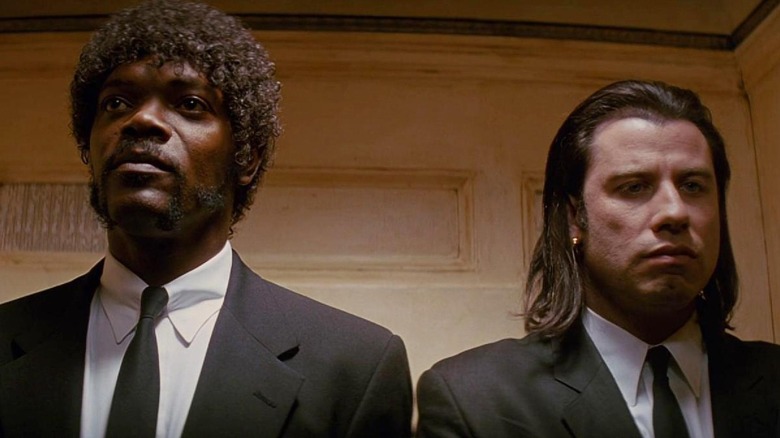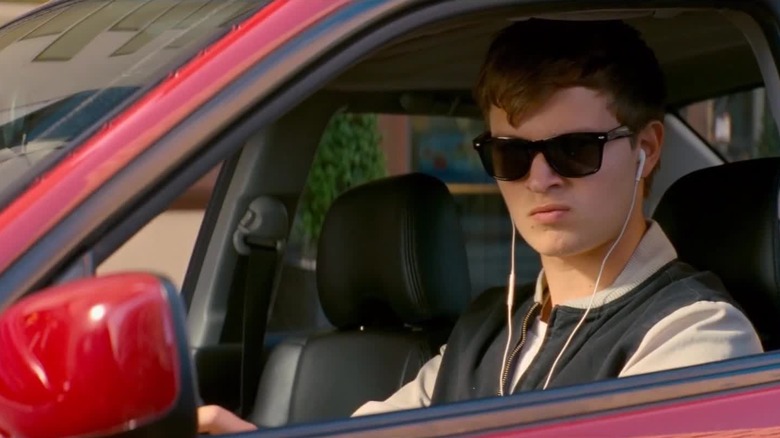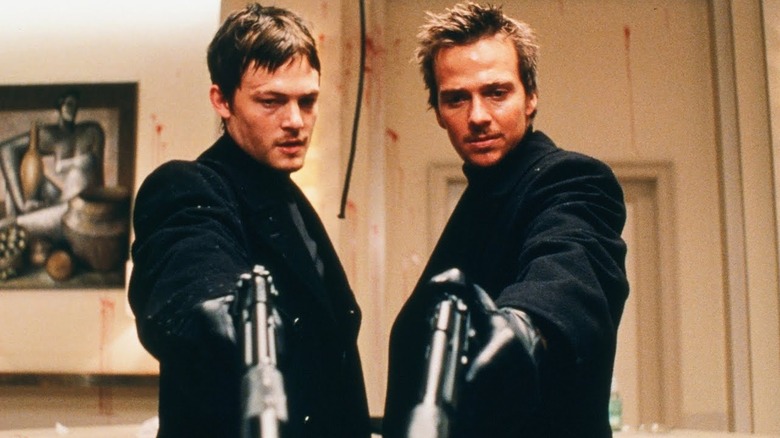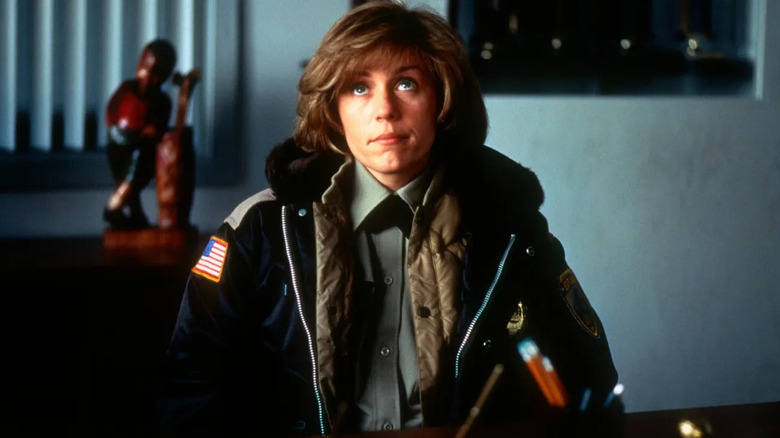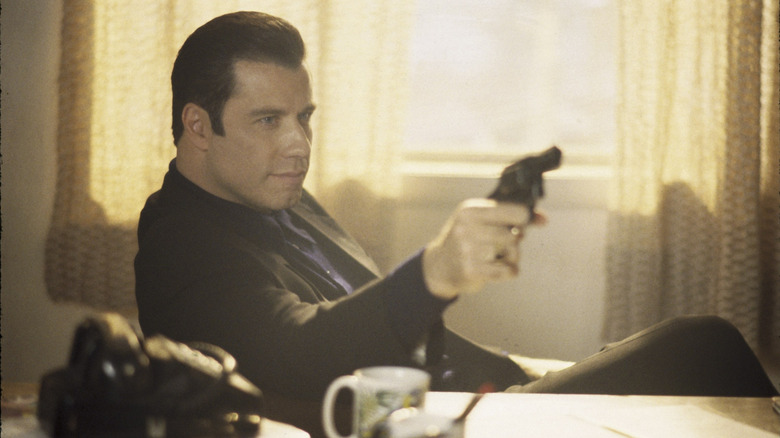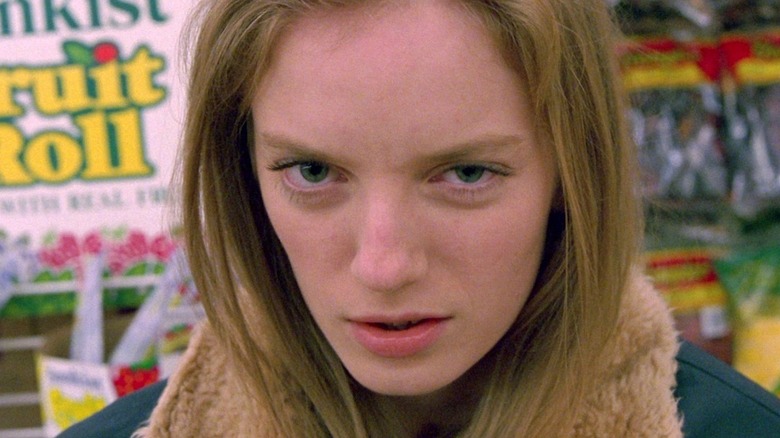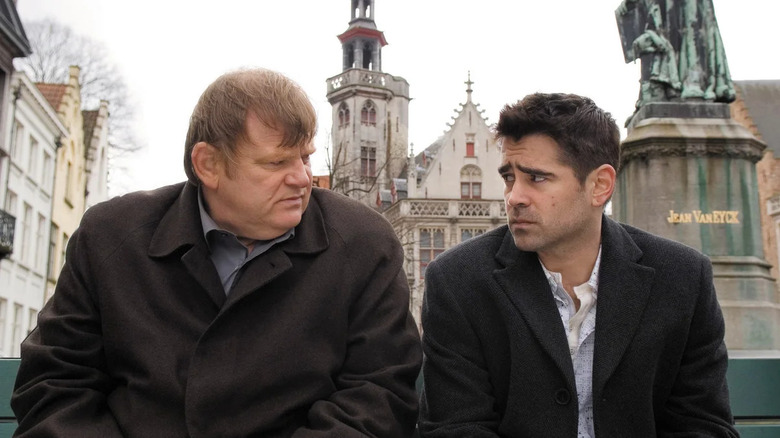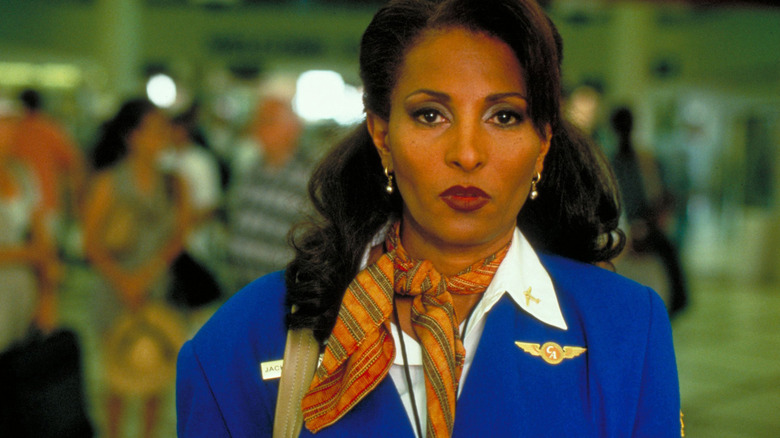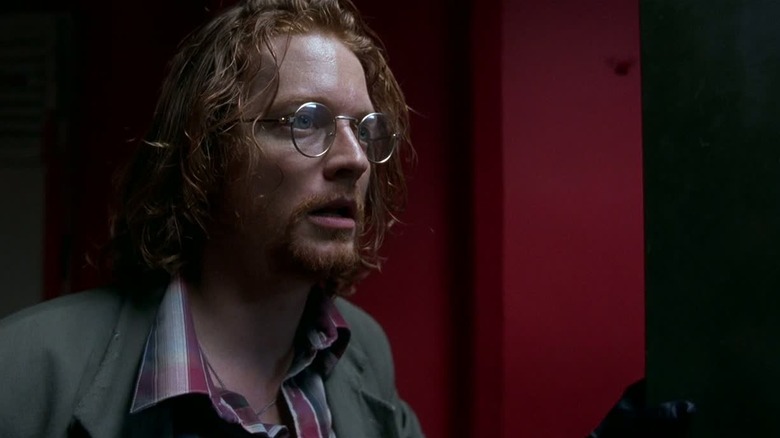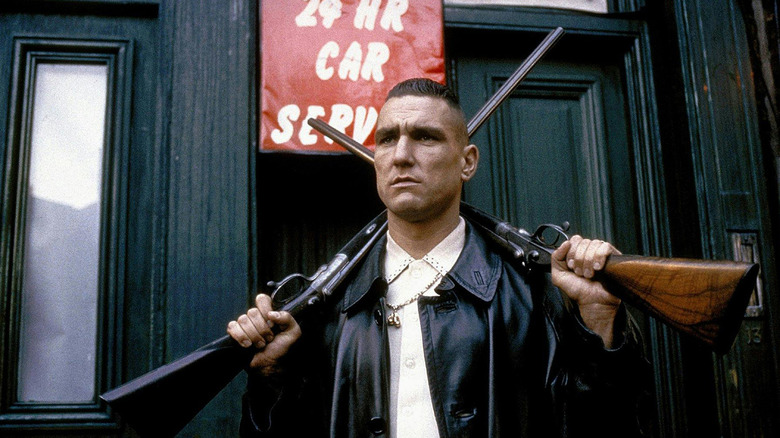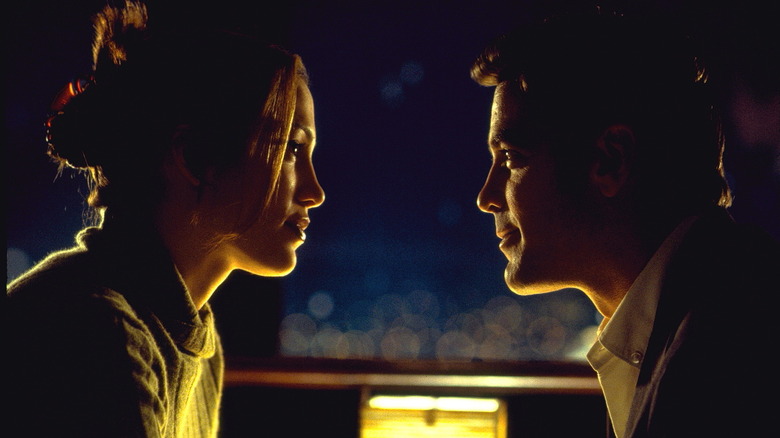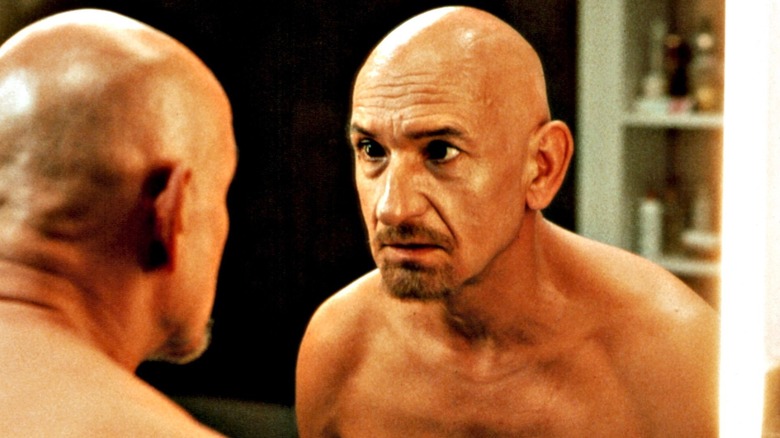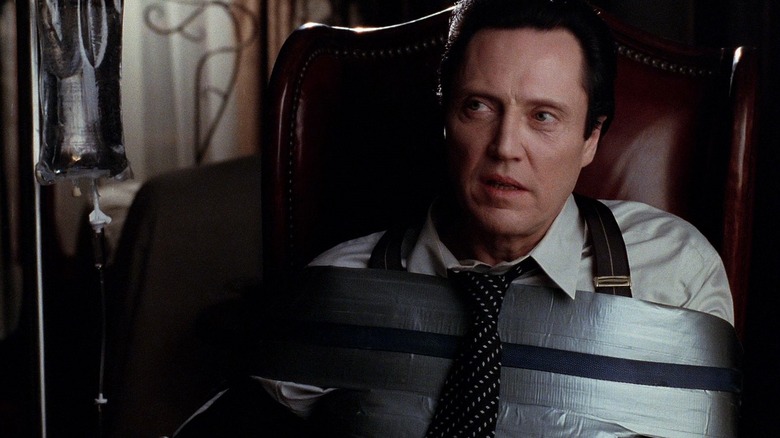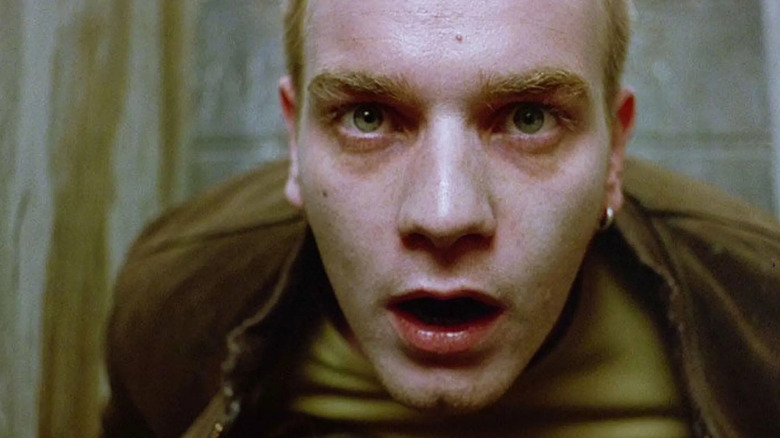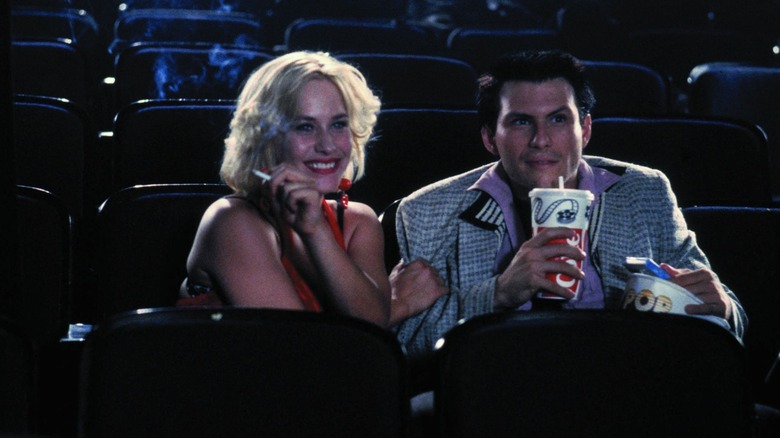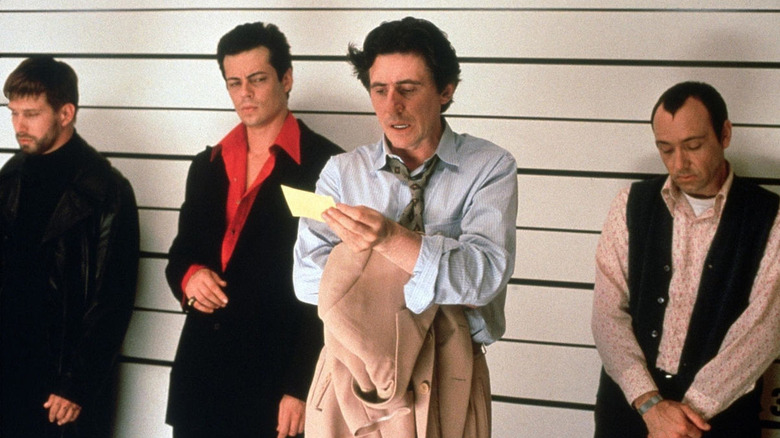The 15 Best Movies Like Pulp Fiction
In 1994, hot on the heels of his acclaimed directorial debut, "Reservoir Dogs," writer-director Quentin Tarantino launched his second feature film. A series of interconnected stories following gangsters, hitmen, fighters, and femme fatales, "Pulp Fiction" quickly became one of the most popular films of the year, and then went on to become not just one of the greatest films of the 1990s, but one of the most influential movies of all time.
If you've just seen "Pulp Fiction" for the first time, you might be blown away by its power, humor, and sense of the unexpected lurking behind every corner. You might also already be on the lookout for more films like it, from more of Tarantino's work to other crime films from the same era that capture some of that same vibe. Here are 15 of the best movies like "Pulp Fiction" that you should watch next, from British crime capers to car chase movies to the adventures of mismatched hitmen gone wrong.
Baby Driver
Two of the most lasting elements of "Pulp Fiction" are without question the way it puts its own comedic spin on the crime genre, and the way it deploys music. Quentin Tarantino's varied taste in pop music and use of it in his films is very well-known, and his ability to craft killer soundtracks inspired numerous other filmmakers to follow suit.
Edgar Wright's "Baby Driver" is, like "Pulp Fiction," a comedic, thrilling new spin on a classic crime story. It follows a getaway driver (Ansel Elgort) who's trying to get out of the game, only to run afoul of a crime boss (Kevin Spacey) and fall in love with a beautiful waitress (Lily James) at the same time. But even beyond its twists on familiar story elements, "Baby Driver" is remembered now for a killer, 30-song soundtrack featuring everything from old-school rhythm and blues to the arena rock of Queen and the glam rock of T. Rex. With these songs driving his car chases, Wright makes the 2017 film into an elaborate series of musical sequences where the dancers are vehicles and the stakes are super high.
The Boondock Saints
"Pulp Fiction" is a movie about relatable, human, quite likable characters who are caught in various criminal webs. Sometimes we just like them because they're funny and clever, and other times we like them because they're doing the wrong things for the right reasons. Those kinds of characters, plus the film's focus on a pair of slick hitmen, might not have been a direct inspiration on Troy Duffy's "The Boondock Saints," but it's easy to see the comparison.
Released in 1999 in the midst of the post-"Pulp Fiction" crime movie boom, the film follows two working class Irish brothers (Sean Patrick Flannery and Norman Reedus) who receive a mission from God to punish the wicked for the sake of the innocent. They set out to become hitmen with a specific edict to only kill bad people, which puts them in direct conflict with both the Russian mob and a clever FBI Agent (Willem Dafoe) who sees just how special their case is. LIke "Pulp Fiction," it's funny, violent, and full of homages to past action heroes and genre icons, and its connection with crime film aficionados turned it into one of those rare box office bombs that became cult classics.
Fargo
There's an argument to be made that "Pulp Fiction" is the most influential crime film of the 1990s, but it's far from the only contender. Two years after Quentin Tarantino's film was released, Joel and Ethan Coen released a crime film of their own, with a very different setting and vibe, but the same kind of staying power.
Set in Minnesota and North Dakota, 1996's "Fargo" — which may or may not be based on a true story – tells the story of a hapless car salesman (William H. Macy) who arranges for his wife to be kidnapped by a pair of goons (Steve Buscemi and Peter Stormare) in a plot to extort his father-in-law and bail himself out of a financial problem. This straightforward plan sets in motion a chain of events that get increasingly complicated, darkly hilarious, and deadly.
Like "Pulp Fiction," "Fargo" was met with immediate and almost universal critical acclaim upon its release, earning the Oscar for Best Original Screenplay just like Tarantino's film did two years earlier. And just like "Pulp Fiction," it's a film with its own particular sense of humor and dark spin on classic crime tropes.
Get Shorty
One of Quentin Tarantino's most important influences, which he discussed often during the era of "Pulp Fiction," was the work of legendary American crime writer Elmore Leonard. Tarantino's work has sent many people over to Leonard's, and the boom of new Leonard adaptations in the 1990s also helped.
Released just one year after "Pulp Fiction," 1995's "Get Shorty" is a crime comedy that, like Tarantino's film, also stars John Travolta. This time, Travolta plays Chili Palmer, a gangster from Florida who heads out to Hollywood and, being movie-obsessed, gets tangled up in a film deal. With a supporting cast that includes Rene Russo, Danny DeVito, Gene Hackman, Dennis Farina, and Delroy Lindo, it's got the same stacked ensemble feeling as "Pulp Fiction," but with a somewhat lighter touch thanks to director Barry Sonnenfeld. And like "Pulp Fiction," it was well-received upon release and remains an essential 1990s crime film, not to mention one of John Travolta's best movies of all time.
Go
Before he broke into giant action movies with "The Bourne Identity" in 2002, director Doug Liman made his name on smaller but no less thrilling comedies. In 1999, in the wake of the success of "Pulp Fiction," he became yet another filmmaker to deliver a Tarantino-esque crime caper.
Written by John August, "Go" takes the same intertwining narrative format that helped "Pulp Fiction" pop, telling three different stories that all tie back to the same ill-fated drug deal. It all begins with a supermarket clerk named Ronna (Sarah Polley), who decides to purchase ecstasy to make a quick buck so she can pay her rent. The film then flashes back repeatedly to fill in the stories of various supporting characters in Ronna's story, adding richness to the narrative and, eventually, building to a wild climax.
If you love "Pulp Fiction," there's quite a lot here that will remind you, in a very Millennial way, about Quentin Tarantino's film, from the multiple narratives to the way it slowly builds out a world. Then, of course, there's the killer soundtrack, which you'll want on repeat for a week.
In Bruges
"Pulp Fiction" first gets its hooks into its audience as the story of two hitmen with very different personalities, who face mishaps on the job, frank discussions of the nature of their reality, and run-ins with an often contentious boss. If that's the kind of story you like, and you're in search of other tales of wayward hitmen, you won't want to miss "In Bruges."
Written and directed by Martin McDonagh, who received an Oscar nomination for his script, the 2008 film follows a pair of assassins, the impulsive and restless Ray (Colin Farrell) and the seasoned pro Ken (Brendan Gleeson), as they're forced to hide out in Bruges, Belgium after a job gone wrong. Along the way, they encounter a slew of strange people, party late into the night, get bored, get in trouble, and eventually face a moral conundrum that neither of them can quite solve.
Like "Pulp Fiction," it's a great study of what life might be like if you were a professional killer. It's also, like so many of McDonagh's films, blisteringly, darkly funny. No hitman movie marathon is complete without it, and for extra fun, it's also the film where Colin Farrell and Brendan Gleeson's friendship began.
Jackie Brown
We've already talked about Quentin Tarantino's fondness for the work of Elmore Leonard, and after "Pulp Fiction," he put that love in motion with his first and so far only adaptation of a work by another writer.
Adapted from Leonard's novel "Rum Punch," 1997's "Jackie Brown" stars '70s movie icon Pam Grier in the title role, a flight attendant caught in the middle of a struggle between a gun runner, a bail bondsman, federal agents, and one very tricky money exchange. Released as Tarantino's much-anticipated follow-up to "Pulp Fiction," "Jackie Brown" didn't reach the same heights as its predecessor. But time has been very kind to it, and it's often called Tarantino's most underrated film.
If you love "Pulp Fiction," you probably want to go watch the director's other movies anyway, but even beyond that, there are a lot of great Tarantino hallmarks to look for here. You've got an ensemble cast that includes Robert De Niro, Bridget Fonda, and the great Robert Forster. You've got Samuel L. Jackson relishing his turn as a villain. And you've got a great soundtrack. It's a must-watch for all "Pulp Fiction" fans.
Killing Zoe
Quentin Tarantino may be the biggest filmmaking name behind "Pulp Fiction," but he's not the only one. The film's script was co-written by Tarantino and Roger Avary, and earlier in 1994 — the same year "Pulp Fiction" was released — Avary came out with a crime film of his own.
Written and directed by Avary and executive produced by Tarantino, "Killing Zoe" stars "Pulp Fiction" supporting player Eric Stoltz and also mixes crime genre tropes with unexpected comedy. Stoltz plays Zed, a safecracker who visits Paris to work on a bank heist, only to fall for a beautiful French sex worker (Julie Delpy) and eventually discover that she's connected to the job in ways he doesn't realize. Zed's own nerves, plus the chaotic nature of the job, mean that he's in over his head from the beginning, and it only gets wilder from there.
If you love the way that Avary, as co-writer of "Pulp Fiction," plays with crime tropes like the boxer throwing the fight or the hitmen getting rid of a body, then you'll enjoy what "Killing Zoe" does with the heist genre. It's a member of the larger family tree of "Pulp Fiction" offshoots that deserves more attention.
Lock, Stock and Two Smoking Barrels
If there's an English counterpart to Quentin Tarantino in terms of the sheer impact one filmmaker can have on the crime genre in a given decade, it's definitely Guy Ritchie. While Tarantino spent the '90s establishing himself as one of America's best crime storytellers, Ritchie did the same thing in England, starting with 1998's "Lock, Stock and Two Smoking Barrels."
Made on a low budget, Ritchie's directorial debut is an dark ensemble comedy with loads of noir elements about a group of friends who, after a gambling scheme gone wrong, plan to rob the gang next door, who are plotting a heist of their own. Meanwhile, a tough-as-nails crime boss is after two antique shotguns, both of which get roped into the robbery.
Ritchie weaves a delightfully tangled, often hilarious web out of these characters and their often unwitting participation in a bigger criminal enterprise, and that alone makes "Lock, Stock" a great companion to "Pulp Fiction." Then there's the cast, which features Jason Flemyng, Dexter Fletcher, and both Jason Statham and Vinnie Jones in their feature film debuts. It's the closest thing we've got to "Pulp Fiction in London."
Out of Sight
Quentin Tarantino is one of the most exciting filmmakers to emerge from the cinema of the '90s, but he's far from the only master of the craft to come out of that decade. Steven Soderbergh is another key breakout director of that era, and he released a crime film in 1998 that's a wonderful companion piece to "Pulp Fiction" and Tarantino's work overall.
Like "Jackie Brown" and "Get Shorty," "Out of Sight" is based on novel by the great Elmore Leonard, this time about a sly bank robber (George Clooney) and his unexpected romance with an FBI agent (Jennifer Lopez) who's trying to figure out all his secrets. It's been credited as the role that saved George Clooney's career, but "Out of Sight" is so much more than a great Clooney vehicle. It's funny, it's exciting, it's got great spins on classic thriller tropes, and the cast includes everyone from Don Cheadle to Michael Keaton, who reprises the role of ATF Agent Ray Nicolette from Tarantino's "Jackie Brown."
Sexy Beast
"Pulp Fiction" stood out because of its ability to flip genre conventions on its head, its sense of humor, and its amazing soundtrack, but it also stood out because of an intense focus on character. We remember the film because of Vincent Vega, Mia Wallace, Winston Wolf, and all the other major characters. If that's what you love about the movie, and you want another crime film that's going to follow in those footsteps, you'll want to watch "Sexy Beast."
Starring Ray Winstone and a ferocious Ben Kingsley, the film follows a career criminal who's now retired, only to find himself tormented by an old associate who shows up and wants to pressure him into robbing a bank.
Directed by Jonathan Glazer, the film is an intense, dark case study in the extent of human capacity for self-preservation, and how far we can push each other before someone snaps. Winstone is great in the lead role, but the real scene-stealer here is Kingsley, who feels like what a Quentin Tarantino character would be if Tarantino's films were set in London.
Suicide Kings
This might be the most controversial recommendation on this list, because "Suicide Kings' did not emerge from its initial release in 1997 with a very strong critical reception. Its Rotten Tomatoes score hovers in the 30s, and it's often compared unfavorably to Quentin Tarantino's smarter, more subversive takes on the crime genre.
That said, there is a lot to love here, particularly if you're following "Pulp Fiction" with more 1990s crime cinema that plays with the conventions of the genre. The film follows a group of friends who decide to kidnap a former mob big shot (Christopher Walken) after one of their sisters is also kidnapped, thinking that they'll be able to trade their target for some ransom money and everyone will walk away unharmed. What happens instead is a dark, twisty, often funny game in which Walken shines as a captive who's always one step ahead of his captors. If you love Walken's single scene in "Pulp Fiction," and want to see him another movie with similar vibes, look no further.
Trainspotting
Apart from both being films that feature intravenous drug use, there's not much that unites "Pulp Fiction" and "Trainspotting." They don't share a cast, they don't focus on the same subgenres, and they head in some very different directions. What they do share, though, is their status as breakthrough films for their respective directors, and their status as two of the best films to come out of the 1990s.
Kicking off with one of the greatest opening moments ever filmed, 1996's "Trainspotting" follows a group of heroin addicts in Edinburgh, Scotland as they deal with substance abuse, poverty, parenthood, and a host of other issues. Directed by Danny Boyle, it's a film that constantly walks the line between comedy and tragedy, and like "Pulp Fiction" it features some incredible camera work, from the opening sequence to a shot of Ewan McGregor diving into a toilet like it's a subterranean lake. It's also got the same sense of great ensemble casting that drove "Pulp Fiction," including great work from McGregor, Kelly Macdonald, Jonny Lee Miller, and Robert Carlyle.
If you or anyone you know needs help with addiction issues, help is available. Visit the Substance Abuse and Mental Health Services Administration website or contact SAMHSA's National Helpline at 1-800-662-HELP (4357).
True Romance
Before "Pulp Fiction," and even before his directorial debut "Reservoir Dogs," Quentin Tarantino sold a screenplay for a movie called "True Romance." Though he didn't direct the 1993 film, it remains an essential piece of early work from the filmmaker, and a great follow-up for "Pulp Fiction" fans looking for more of that Tarantino feeling.
Directed by Tony Scott, the film tells the story of Clarence (Christian Slater), a kung fu movie fan who falls in love with sex worker Alabama (Patricia Arquette). In an effort to free Alabama from sex work and skip town, the couple accidentally steal a bag filled with cocaine, and are suddenly thrust into a world of violent criminals, grave consequences, and the ultimate test of their love.
Because it was written by Tarantino, the film features plenty of the director's hallmarks, from references to classic kung fu and crime cinema to long monologues to moments of tremendous, harrowing violence. And while the director is different, Scott both helms the film beautifully and packs plenty of familiar Tarantino faces into the ensemble, which includes Christopher Walken, Samuel L. Jackson, Brad Pitt, and Chris Penn.
The Usual Suspects
In early 1995, Quentin Tarantino and Roger Avary won the Academy Award for Best Original Screenplay for their work on "Pulp Fiction." The very next year, Christopher McQuarrie won the same award for another sharp, instant crime classic that ranks with "Pulp Fiction" and "Fargo" as one of the finest of its kind to come out of the '90s.
Starring an ensemble cast that includes Chazz Palminteri, Gabriel Byrne, Kevin Pollak, Benicio Del Toro, and Kevin Spacey, "The Usual Suspects" is a non-linear story that attempts to unravel the tremendous criminal reputation and campaign of fear overseen by a mysterious figure known as "Keyser Soze." Through its cast and a series of recollections, the film both paints a picture of infamy for Soze and questions who he really is, building to a twist ending that's still one of the best bad guy reveals in movie history. It's not as stylized as "Pulp Fiction," but it's just as gripping, and if you're looking for the best crime films of that era, it should be on your list.
